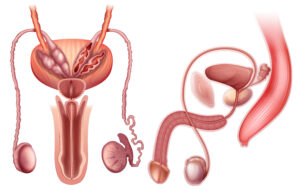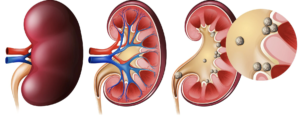
When to See a Urologist and What To Expect: A Guide For Men
1 in 2 people will be affected by a urology condition
The Urology Foundation suggests that 1 in 2 people will be affected by a urology condition in their lifetimes, but often people are either too embarrassed to ask for help when they have a problem, or don’t think a doctor would be able to help.
Ideally, any man above the age of 40 should add one more item to his to-do list: book a visit to the urologist.
For men, this is an important step in looking after their body, as a urologist can identify and treat several key issues that affect long-term health.

In the U.K, approximately 1 in 8 men will be diagnosed with prostate cancer in their lifetime. In addition, testicular cancer is the most common cancer in men in their late 20s and early 30s, with an average age of diagnosis of 33 years old.
It is also estimated that up to 7% of men are affected by infertility. All of these issues fall under the care of a urologist.
What is a urologist?
Urology is a branch of medicine that deals with the male (and female) urinary system and includes the reproductive system.
Specifically for men, a urologist is trained to deal with diseases that involve the kidneys, adrenal glands, bladder, and male reproductive organs. Men’s sexual health plays a large role in the field of urology, including erectile dysfunction and low testosterone.
A considerable part of a Urologists job is to also help with cancers of the male reproductive system.
Some examples of urologic diseases or issues:

Prostate enlargement:
The prostate is a small gland, located in the pelvis, between the penis and bladder. If the prostate becomes enlarged, it can place pressure on the bladder and the urethra, which is the tube that urine passes through. If you find yourself going to the bathroom more frequently or in the middle of the night, this could be the issue.

Kidney stones:
These are a painful and quite common issue, with more than 1 in 10 people affected. They can lead to kidney infections or the kidney not working properly if left untreated. This painful issue is caused from either dehydration, diet problems or too much calcium excretion by the kidneys. Back or flank pain, nausea and blood in urine are common warning signs.

Urinary tract infections:
You might know you have a problem if you experience pain or discomfort while urinating, and a burning sensation might accompany it. You may also feel the need to urinate more often, including during the night, and your urine may be cloudy. This can be accompanied by a pain in your back or abdomen and a high or low temperature with chills.
Urinary leakage:
Incontinence is a serious bladder issue. An overactive bladder muscle, a weak sphincter or an overflowing bladder may cause unfortunate episodes of leakage.

Low testosterone:
As men grow older, testosterone levels naturally decrease. But too much loss leads to hypogonadism, which is defined as testosterone levels below 300 nanograms per deciliter. Low sex drive and fatigue are common warning signs.

Overactive bladder:
More than 20 million struggle with frequent urination, rushing to the bathroom and trips to the bathroom at night. The usual cause is the bladder spasming while filling with urine.
When might you need to see a urologist?
Ifyou are experiencing any of the following conditions, it is likely you will already be seeing a urologist or recommended that you do so:
- Any concerns regarding the testicles, penis, or prostate
- Cancer of the kidneys, bladder, testicles, penis, or prostate
- Hormone imbalance such as low testosterone
- Issues when urinating such as pain or the presence of blood
- Sudden changes in smell, color, or odour of urine
- Urinary leakage or problems with urine flow
- Kidney stones or kidney pain in general
You might be referred to a urologist for many other reasons. This can include erectile problems resulting from low testosterone, so testing will be done to determine the level of fertility issues such as low sperm count.
In addition, Urologists are the medical professionals who perform vasectomies, a severing of the tubes that carry sperm from the testicles, resulting in permanent sterilization so that conception cannot occur with a partner.
However, the procedure can be reversed and is all part of the vast, varied and highly specialized work that urologists worldwide do every day.

What does a urologist do on the first visit?
During your first appointment with the urologist, several things will happen. Mainly, be prepared to discuss why you’re there. It may help for you to bring a list of questions or symptoms related to why you made the appointment. You should also be prepared to fill out paperwork and answer questions about your medical history and any medications you might be taking.
Your urologist is likely to order tests to diagnose your condition and to determine the best way to treat it. Some of these tests may include:
- Physical examination: The urologist will perform a physical exam. They will concentrate on the genitourinary system and evaluate other systems as well. The physician will perform a genital exam plus a digital rectal exam to assess the prostate. Urology exams are generally quick and painless.
- Urine sample: The urologist will want a specimen to test, so it’s advisable to turn up for your appointment with a full bladder.
- Blood tests
- Imaging tests, such as ultrasound or computed tomography (CT) scans.
Your urologist may want to do additional tests to check testosterone levels, kidney functions, semen samples, or a test for PSA (prostate-specific antigen). In addition, they may require further imaging studies.
This can include sonography of the kidneys, the bladder, and/or the prostate; or an imaging scan to visualize specific organs. This will all be discussed with you after the initial exam.
After the examination, the urologist will discuss a treatment plan for you to determine what is happening. Some patients may need a follow-up appointment arranged or may be booked for surgery.
What should I look for in a men’s urologist near me?
There’s no need to be anxious about a visit to see a urologist. They are highly trained professionals who will treat you with respect, patience and give you all the time you need to ask questions.
This is especially true at a Private Hospital such as ours, as unlike a general hospital, we typically won’t have high numbers of patients and doctors rushing around, so our medical professionals, can and do spend more time with the people they’re diagnosing and treating. Such is our high standard of patient care, we are rated ‘outstanding’ by the Care Quality Commission.
Our industry-leading urologists are available now to see you at our award-winning, friendly, private hospital in Preston. Get in touch with our team to book an appointment.
Get in contact
For more information or to book a consultation with one of our leading specialists, contact our team by calling 01772 663977, or you can email on:
